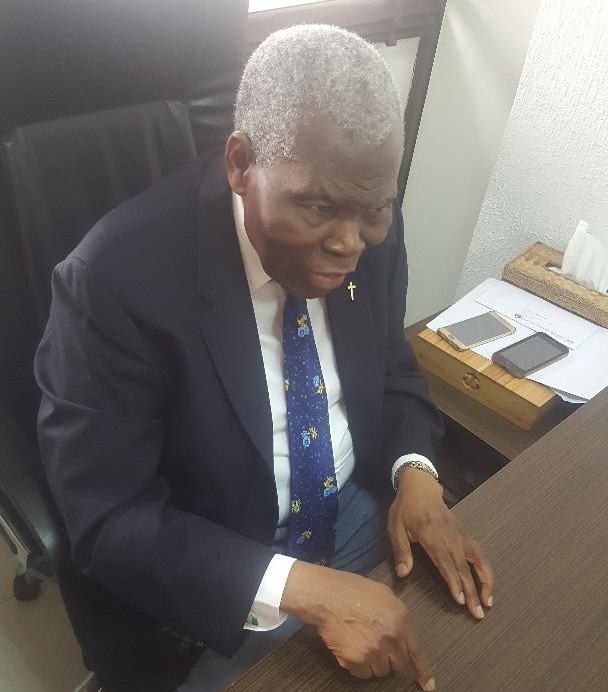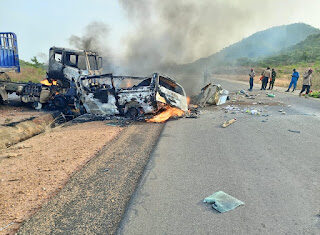At 87, Dr. Christopher Kolade, an accomplished diplomat, boardroom giant and academic, former director general of the Nigerian Broadcasting Corporation, former chief executive and chairman of Cadbury Nigeria, and onetime Nigeria’s high commissioner to the United Kingdom, is still as sharp as a razor. Unassuming, witty and urbane, he makes his point without being offensive.
Without ever raising his voice, he is assertive and holds tenaciously to his worldview. When it comes to the future of Nigeria, he is an incurable optimist who frowns at the word impossibility.
In this two-hour interview with TheNiche trio of IKECHUKWU AMAECHI, OGUWIKE NWACHUKU and ISHAYA IBRAHIM, Dr. Kolade dissects the problems of Nigeria, proffering solutions.
At 87 today, you had come of age relatively when Nigeria became Independent on October 1, 1960. What were your expectations then and the expectations of your generation?
In October 1960, I was actually already a senior civil servant. I had just moved from being an education officer three weeks before October 1 to becoming the controller Western Region of the Nigerian Broadcasting Corporation. You could see that I was already, if you like, gainfully employed.
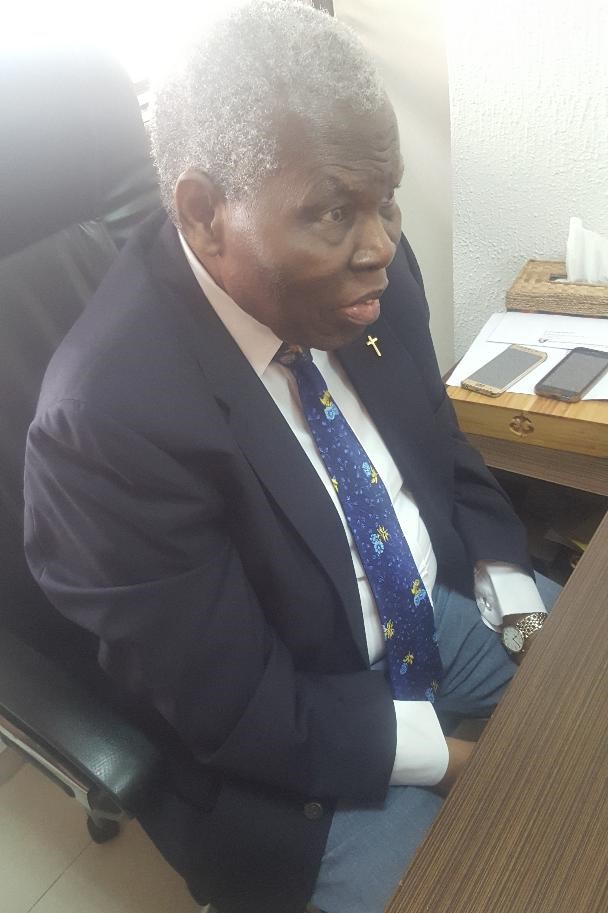
But let us also remember that in all the years leading up to 1960, there was a great deal of uncertainty in this country because we were a colony of Britain. Our political leaders were struggling to free us from this colonial status, and psychologically we all felt that this was a good thing – that we should stop being a colony of anybody and be independent, sovereign, especially since Ghana had become sovereign about three years earlier. So, it was something that we desired. But I think there were two things when you were asking what our expectation was.
First, we believed that sovereignty was something we could handle. When we looked at ourselves, especially some of us who were already in position of responsibility, and we saw the way we’ve been educated, and we looked at these political leaders and what they had achieved, we thought that things should go smoothly. What we did not appreciate, and we could not have appreciated, was that the psychology of the political leaders would undergo a change when sovereignty came.
When you are fighting to get something and you can see your adversary in front of you, your energies are mobilized to confront the adversary. And if there are people of like-mind to you, you can mobilize them as well, and you focus on this adversary, and because your objective at that point is singular, you can focus and you can actually mobilize people to something that looks like unity in confronting this adversary.
There were two important things however. One, the adversary we were confronting is our current boss. He is the one that is running the country. And therefore, we could not force him to give us sovereignty. They would only give us sovereignty when they felt that it was in their interest to do so. I don’t think any of us understood that. We actually believed that they had no choice. But with the reality we saw later, they would only give us sovereignty because they felt now it is in their interest to do so.
Secondly, all those who were now coming into governance responsibility had no experience outside of the colonial experience. We had not run any other thing before. So, we were having responsibility transferred to us. Particularly, those political leaders were having responsibility transferred to them for which they were not adequately trained. Because suddenly it hits you that if you are taking up a new level of responsibility, you require preparation, you require for somebody to have to prepare you for what you are going to do when you get there. But as I have just said, the person to prepare you, will do that which he feels is in his own interest going forward. So we found ourselves achieving sovereignty, but really if you look at the economy of the country which is one of the platforms upon which you express sovereignty, if you look at the social arrangement and structure of our country, you will find with hindsight that all the things you ended up with were not your choice. They were what you were permitted to come to by the person giving you this sovereignty.
Let me do a parallel here. When France was giving independence to its own colonies in Africa, France decided and the people rejoiced that they were going to be French citizens, that they had citizenship of France. And therefore, there were certain ways of management that flowed from that. That you are really independent but you are not totally responsible for what you are doing. You still look up to a mother country for important decisions, particularly decisions as to how you relate with your neighbours.
Differently, the British gave us sovereignty and they said ‘go and handle it. You are on your own.’ Even the passports that used to be British passports and the financial system that used to be based on the British system, they said go and create your own. And this is important. Then, you have to ask yourself, when I accepted this sovereignty, what did I expect to happen? What did I expect to do with it? Because if what I’m going to do with it is something for which I have not had training and preparation, I’m going to perform less ably than I would if somebody had actually trained me for it.
Let me give you something tiny which we did not realize at the time but with maturity in our sovereignty we could now realize. Take Ikoyi in Lagos for instance or the GRAs around the country. Those places were built and were prepared for the colonial leaders, those who came from abroad. Every part of the infrastructure was tailored to what they wanted. And in reality, a GRA in the colonial days was a place where only the expatriates lived. That’s the reality of it. And even in the early years of independence, it was mainly for expatriates.
Now the points. If you look at the social structure of our society, the concept of a GRA where the people in power lived as contrasted with the rest of the place where the governed lived, that psychological concept of master and servant remained a reality. The only problem now was that the master was one of us and the servant was also one of us. How do you relate to each other when you find yourself in that situation? I just gave you that illustration to show that the social fabric should have been redesigned if we were adequately prepared. And therefore, up till today the psychological attitude of even somebody in the House of Reps or the Senate is of him being the ruler and the rest of us being here even though we elected him to go there, that would not have continued up till now if we had had adequate preparation. But you can only understand these things in hindsight.
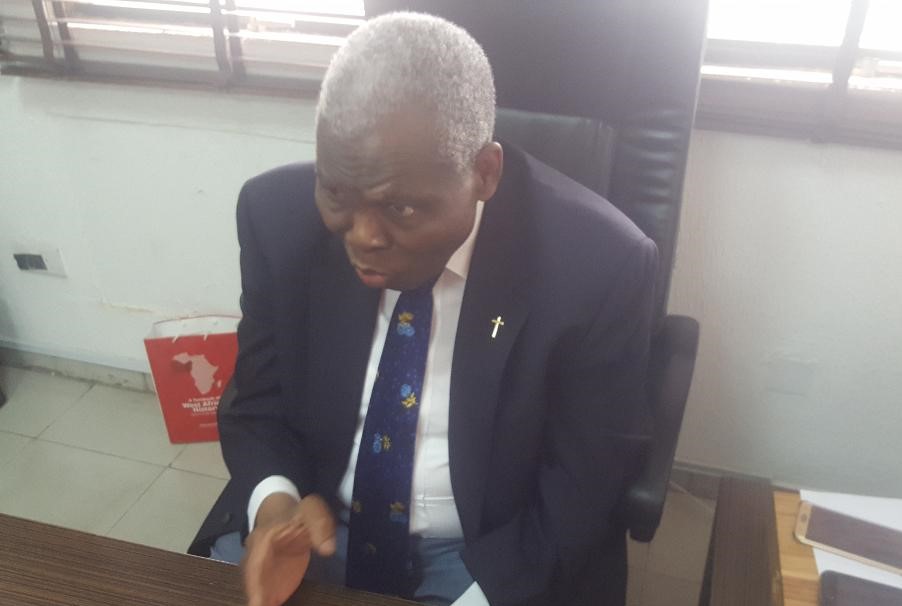
The point now is that when you say those of us who were around at the time what were our expectations? The next question would be are those expectations being realized now? You will see that there was a fundamental reason why those expectations were unrealistic.
But 59 years down the road, why are we incapable of learning assuming we did not know then?
I’ll explain my own view of that. It was bad enough that we had the struggle of even managing our sovereignty. Then the military intervened. And that military intervention at the time looked welcome.
Why?
Because that thing I talked about – the political leaders looking like masters, rulers, contrasting with the rest of the population – did not sit very well with everybody, especially since some of those political leaders misused the opportunities they had and misused the access they had to our public purse.
When you are given the responsibility of managing the resources that belong to all of us, there are several ways of doing it. If you give yourself the first call of those resources, and the rest of us are standing in the queue behind you, then that access to our resources becomes a critical factor to how the rest of us see the future.
It means that if we are going to continue this situation like this and you are our leader so to speak, but you will always be able to take whatever you want out of our common wealth and the rest of us can take whatever that is left, if there is no prospect that we can peacefully and in an organised way change that, that is why you get military coups. That is why these impatient young people who are also holding guns believe that this structure, they don’t want to endure it, particularly because they can see that not only are these political leaders well-off today, they are sitting in a scheme that made sure that they and their successors continue to be well-off compared with the rest of us.
And that is the fundamental reason why those who can force them out of office tend to do so. If you have a young man who is a Major and given a gun and anybody runs scared when they point a gun at them. That is how military intervention happens. Of course, the difficulty with military intervention is that they are even worse prepared for this responsibility than the ones they are throwing out. So, if there were issues in the social structure that were bad before, they became worse because now if the person that is in that position says constitution suspended, if he issues a decree, you can’t go to court and challenge it, then you suddenly realize that the freedom you had before had been seriously curtailed, then all the other things that flowed from that will have to confront you. Then you’ll have to say, what the next stanza is. If it is not the political leaders and it is not the military people, where do we go next? And all of these, please understand, these are my personal conclusions of where we have been and where we are.
There are people who think that your generation is largely responsible for what Nigerians are going through today because they were unable to manage the polity and the economy the way they ought to which brought the military. Is there any justification for them to look at Nigeria as it is today, particularly the younger generation and cast aspersion that they are corrupt when ab initio it originated from them?
For me, the finger pointing that says you people brought us into this situation is simply an easy way out of the problem. It shows that the people who are relying on that concept don’t want to do the work they need to do. It’s like if there is a young person that is growing up in my village (my village is very far from any urban centre), whatever exists in that village represents for him life. That is what he knows as the world. For the fact that in the same country, and may be not even very far away, there is a city where you can have electricity, and if you have an idea you can bring it to realization because there is infrastructure to support you, this young fellow in my village doesn’t know that. And therefore you can’t blame him for not even thinking about it.
The generation that secured the independence, if there had been some means of preparing them for responsibility they were taking on, then you could come back to me and say in spite of the preparation you had, in spite of all the training we gave you, you still got it wrong.
Believe me, when the late Ooni of Ife, Aderemi, became the first Nigerian indigenous governor of the Western region, he took over from an expatriate who was living in that place on the hill and who had all the paraphernalia of office. How could the new Nigerian governor have thought that this is not the way a governor should be? What kind of training did he have that should make him realise that he should not go and live in that place, that he should be closer to the people? They inherited situations that were natural to them.
So, the only thing that we should ask ourselves is that we inherited the situation but we didn’t have to persevere with the structure. You could have said, what kind of country do we want to have? What kind of relationship do we want to have among our people? And how do we get there? So, to that extent that they did not take time out to think that way, you can say well, they should have known better. But I can tell you, when you inherit a situation where everything seems to be going well, you tend to think there is nothing wrong here until one night the army comes knocking on your door to say out of here.
Factually, yes this was a generation that took over from the colonial people and had the responsibility to build the future but what equipment did they have for carrying out that responsibility?
Younger people, particularly university students have come to me to say your generation got it wrong, they are the ones that did this, even one of you said we are a wasted generation, I say well you can say that now. But supposing I even accept that that is the truth, if I got it wrong, and somebody is now flogging me for getting it wrong, do you have to stay in the queue behind me and wait to be flogged? So, do what you are accusing this generation of not doing, do it. Say to yourself what kind of a country do we want? What should be our situation?
And look at the kind of things we have tried. We say we are a federation. We create states, we create regions, we do all kinds of things and we haven’t still changed to satisfaction. So, it shows that each generation will do what it is capable of doing. But the generation of today, of the educated young people that have interacted with other parts of the globe, how are they using what they have to build what they want to see?
Let me give you one example. For years we thought that people in the National Assembly were taking a lot of our money and we didn’t know how much it was. Until Shehu Sani gave us the information, we were all guessing that these people take too much money. But no one could have said this is how much they were taking. This is a country in which many young people in their 20s have not only gone to the university for their first degree, they have studied to get their Master’s degree. And one of the absolute imperatives to have a Master’s degree is that you must do research. How come you can’t do the research to tell you how much these people are taking of our money? So, whenever people say to me your generation got it wrong, I say agreed. So, how about your own generation? What are you doing now to correct what was done wrong?
With what you’ve observed, do you think that Nigerians can ever get it right?
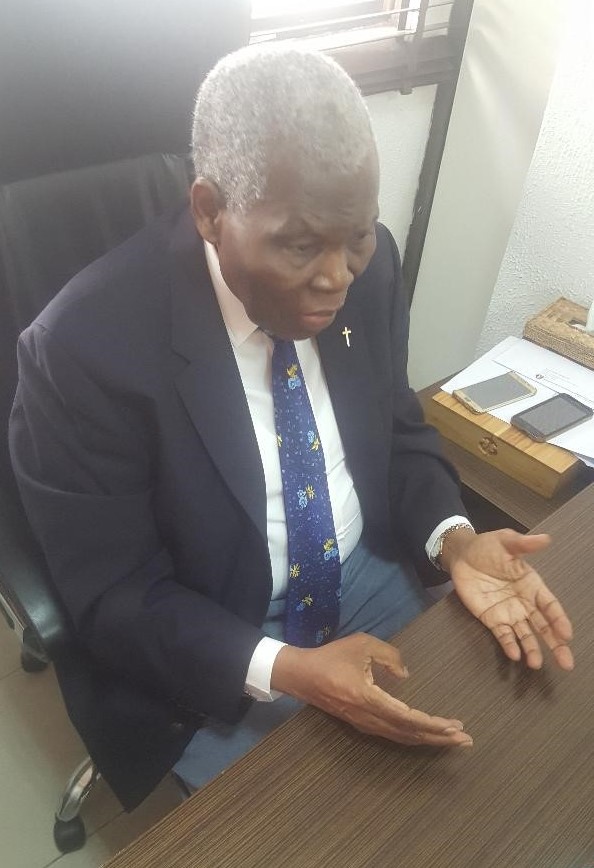
I am so optimistic that we will get it right. And I am optimistic for many reasons. But let me share two. First of all, the identity of any group of human beings, is something that you should think about. What is my identity? And you will discover that there are many people who are sitting on their identity right now because you send them to school, they’ve graduated and they are even doing some work. But still they are mentally dependent on what the system can do for them. And that is not unusual to find, because if you don’t want to train, why do you go out to train to be a runner?
But the thing that we all ignore is that even at young age, God gives us the ability to look ahead. And depending on how you see yourself, you learn to look ahead in a responsible way or you look ahead and say I don’t like what I see so I won’t try to get there.
My identity to give you my own illustration, is at three levels. There is what I know about myself. There is what other people think they know of me or want me to be. But thirdly and most importantly, there is the identity that the Almighty God who created me has given me.
Now, when you see somebody who is born into a rich home and doesn’t need to do anything to earn his pay, but he insists on going out to sweat, to do things that trouble him, you ask yourself why. He doesn’t need to, but he is doing it. So you will understand that there is something inside of him that he is expressing. That is identity. He is not staying on what people think he should be. He is saying that God has given him the ability to reason his way through this thing and to even make an effort to create something.
If only we could all understand these things and say what am I doing with my identity? I have had the good fortune of going outside this country to represent Nigeria. And because I was doing that, I met with thousands of young Nigerians who were living abroad. And because they were in different social structure, if you are going to do well, they are honest with you there. You can’t buy it, you can’t lobby it. You have to show performance. And performance arises from an expression of your identity because if you see two young people and you give them the same amount of money to go and do something with it, how it comes out depends on the expression of what you think you have.
Now, our educational system needs to understand that. Yeah, taking us through the formal three hours and stuffs like that to build up capacity, but what that individual will be eventually is not dependent on school. It is a combination of what happens at home, what happens in school, opportunities, challenges, threats that this person meets and how the response is crafted.
Let’s take an example, Phillip Emeagwali, the computer guy. Why did he go and do what he is doing? What is it that is driving him? And you have to understand that it is an expression of something in him. And fortunately for all of us, there is something in each of us. But you have to take some action to actualise and activate it if it is going to contribute any significant value to what has been handed to you.
Our society somehow diminishes the capacity of people to self-actualize. All over the world Nigerians are making fantastic progress. Bring those talents back to this society, those talents are terribly inhibited.
(Cuts in) So, who is running the society?
Do you think that Nigeria structured as it is, constituted as it is now, can ever make that quantum leap which you are so optimistic about?
I am optimistic that it can. Why? Because right now, there are Nigerians who have come here to show what they can do which suggests to me that there are Nigerians inside here who also have things they can express. But as you say, there is something about here that tends to constraint all of that. But who is causing that constraint? That is not coming to us from outer space. It’s coming to us from the way we handle ourselves and do these things.
Let me give you an example you have experienced yourself. During the year 1999 to 2008, you were living in Lagos and your daily experience was that if you wanted to drive through Lagos, there were heaps of refuse, all kinds of disagreeable things. In those days, if you wanted to go to Marina or Broad Street and you take public transport, you had better eaten a good meal to fortify yourself because to enter the Molue, you would exercise what is called survival of the fittest.
Then suddenly somebody became Governor of Lagos State and he said we can change that. We can change all those things. And those intersections where miscreants used to reside will be cleaned up and even beautified. As for this business of fighting to enter Molue, we can change all of that because if we provide another alternative, people can change. People can do better.
The capacity to do better is in us. Somebody leading a government decided to do something about this. Doesn’t that tell us something? It tells us that whatever may be our negative in any aspect of our situation today, there is somebody somewhere who can change it. How do we find this somebody? That is why I am optimistic because I know there is somebody somewhere who can change it.
I have gone through an experience because I was sent outside of this country to be an ambassador in Britain. And the situation that we entered when we got there was not the best. There were certain indices that showed that we were doing very badly in some areas. And so the challenge was, can we do better? What will it take for us to do better? And by the grace of God we identified those challenges. It came to a point where some Nigerians that were living in the UK at the time decided on their own to create what they call a group of 50 whose only objective was to look for investment opportunities in Nigeria. I’m not a magician. It’s just a matter of showing people that if you are sitting in the mud today, the ability to get up is within you. Don’t let the organiser of the mud thing enslave you forever.
Are you being overtly idealistic? Our society is not merit-driven. For instance, if you take the political class, those that get to positions of leadership seem to be the worst.
(Cuts in) Or let’s say they are not the best.
Okay, they are not the best. In other societies, Great Britain where you were a High Commissioner, U.S., France, etc., those that form the leadership core are the philosopher kings. Why is that not so here?
Let me again explain something. When we see how other people are doing things, we say to ourselves let’s do it the way they are doing theirs. First, after colonial government, we went for parliamentary system which we inherited from Britain. Somehow, with military intervention and everything, that didn’t work. We said the American system is the thing for us, let’s go for that. So we decided we must go for that. But there are certain in-built checks and balances that make those systems effective and you have to have those checks and balances before you can be sure of effectiveness.
Let me make one or two suggestions, if somebody in those places we are copying were actually caught committing a crime, what are the chances that that person can actually wangle his way out of justice? What are the chances that somebody responsible for bringing him to book will not eventually come after him after even several years? You have to create a system where there are checks and balances.
If there are 200 million of us today, not all 200 million Nigerians want to be 419 or kidnappers and so on. Yes there will be those ones, what about the ones who want to do well? How can you make sure that somebody who wants to do well, the opportunity to do well is there? That is why we have a constitution that says our national ethics is social justice, integrity and so on. Words! Words! What do we do as a people when somebody gets into that position that he actually has to show us how he is using his integrity? I need not remind you that today, there are things in the news showing some of our well-known names are not living respectable lives. Does that mean that we are a society that cannot change that? No. We can change it but we haven’t yet found a way to make sure that it changes.
How do we find that way because Nigerians seem to be so docile?
I’ll tell you how we can find that way. When I was still managing business, I entered into management at a relatively young age. In fact by 39, I was already director-general of the Nigerian Broadcasting Corporation. I was able to fight what people describe as culture, that in our culture, which is an excuse but it is not a good thing, that when an old man says this is the way we are going, you say okay he must know better. We must follow him. But when a 39 year-old person becomes the director-general of the Nigerian Broadcasting Corporation, you can’t be describing him as an old man. So, when he says this is where we are going, why don’t you challenge it because it should be possible for us to say anybody in a position of responsibility, hold yourself accountable and be accountable to us because we put you there? You are using our joint resources to run this place.
You say Nigerians appear to be docile. Yes. We are docile because we have not yet accepted and owned our own responsibility. And until we do that, it’s going to be difficult to change the system. But there is no school you go to for them to teach you how to do that. But there is something inside the human being that has been created inside the human being that says no I will not stand for this any longer. I’m not saying you should go and do revolution using methods that are actually against the law. I am saying what is it that prevents the under 35 in this country into forming themselves to a group to say let’s do a vision of the kind of country we want to see and let’s make sure it happens. But we don’t take enough interest to do that.
In principle, it is good to be as optimistic as you are, but in reality, it is a different ball game. The picture you are creating is the ideal picture of what Nigeria ought to be but the primordial cleavages – ethnicity and religion – make it practically impossible to have that pan-Nigerian dream that everybody can key into. So, how do we deal with that?
So, when someone, in reaction to what you are saying, brings the irrelevant issues of ethnicity and religion into the argument, what’s your response?
My response is to say this is not about ethnicity or religion. This is about Nigeria.
No. Your response is, you cannot stop me in what I am doing. If you want to understand what I am doing, you are free to talk to me and seek explanation. But you are not going to stop me in what I am doing. Then I look at the next man, this is what I am doing, are you with me or not?
See, there are enough people in this country who want to do well, who want a good nation, who want to see us progress. But for many of us, we do not have the heart to continue fighting something that looks impossible.
For me, I do not accept impossibilities. I accept that something is difficult, I accept challenges, but I don’t accept that anything is impossible. And please don’t think that I am special or unique. There are many other people that do not accept impossibilities. In fact I believe you are one of them because you would not continue to do what you were doing if you believe that something was impossible. You would not persevere with what you are doing if you thought that the destination is impossible. You continue to do what you are doing because you think there is the remote chance that you can make something of this.
Please understand me, unless people of your age group actually believe that and work with it, there is no future. I do not understand why any young person should settle for a situation that says I can’t do anything about this. If you can’t do it yourself, you can find somebody who can do it. But if it settles in your brain that something has to be done here, you will find a way to do it. The problem in this nation is that we too easily back away from challenges. We too easily accept that because something has been happening like this for so long, it must go on.
Many people believe that Nigeria is already primed for disintegration. The way the country is currently constituted and the things that are happening because of that, do you think that narrative could be possible?
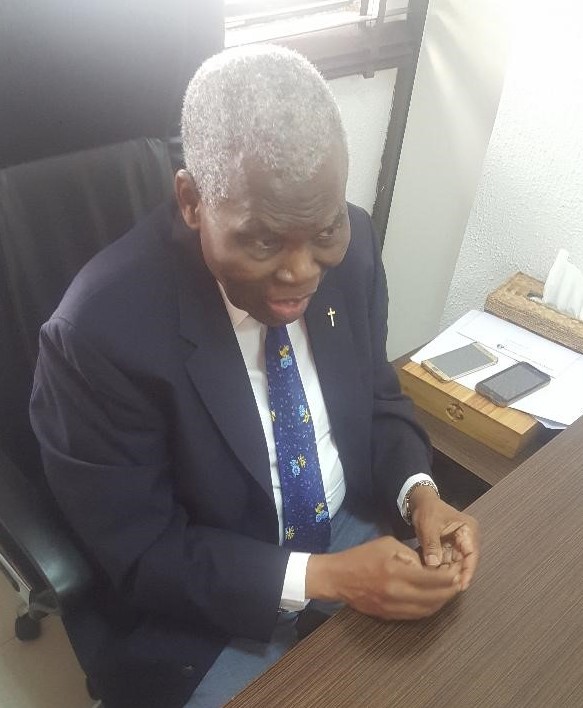
It will happen only if we let it. If we actually permit disintegration, it will happen. Then we will have to ask ourselves what was I doing when the process of disintegration was taking place? What could I have done, because every single one of us has a capacity to do something. It may not be much. I say to people, if I could be sure that I can live a life where kidnappers would not come to me, where herdsmen would not be there, that is what I want. But that is not the reality of my country now. The reality now, as I was saying to my wife this morning (October 18) when we were looking at television, this kidnapping thing in some parts of the north has become a business. But you see, it takes more than just saying it for you to be able to do something about this.
What I do here, I invite young people who want to do well, and I say to them what are the challenges, how can you deal with those challenges. And by the grace of God it works because if you say to a young man that if they say to you that before you pass through this gate you have to pay a bribe, tell them you don’t have a bribe but you still want to pass through the door. That person standing by the door, holding it against you, in the course of time, he is going to say to himself, ‘this bad person, he thinks I’m going to spend my whole life here. Come and pass.’
I have this experience when I was in Cadbury Nigeria. We were having problem with the Customs Long Room at Apapa. Things were not coming out as they should. So, one day I decided I would go myself. It is not the MD’s role to go to the Long Room and start asking where is our goods. But I decided to go. I went to Apapa. I eventually got access to the Long Room. As I entered from the door, their boss was at the other end of the room and he must have seen me. And he shouted to his people and said ‘that man that just entered, give him what he wants and let him go.’ And so, I now had to fabricate what I wanted (general laughter). I didn’t go there to want anything. I just wanted to establish why the delay.
There was another occasion that we wanted import license, in the days of import license. We sent a middle-level manager who was in-charge of this thing. We filled all the forms, we did all the things. But he kept coming back to say they said he should come back next week. That it is not ready. One day he came back and said that the deputy permanent secretary said to him, ‘this your people that keep sending you here, they know what to do. Why are they making things look difficult for you? Okay tell them we don’t want 10 per cent. We will take five.’
He came back and told his boss, a director. I was the MD then. So the director came and told me that they wanted five per cent of the face value of the import license. So I said to the director, ‘You know what, stop sending him. Go yourself. When you get there, tell the deputy permanent secretary that this is what you’ve been told. That you just came to verify that it is truly five per cent because we didn’t know whether our man was trying to do something for himself. And that if it is truly five per cent, you as one single director cannot take that decision. You have to come back and tell the rest of us. Then the board will meet and they will agree the five per cent. I said tell him that you don’t see any problem with that. That it is our chairman, by that time Gamaliel Onosode was our chairman. That our chairman will put the money in an envelope and come and deliver it personally because we have to convince the chairman that we are not playing tricks. So he will want to know the person we are delivering it to, so he will come himself and give it to you.’
So the director went and said these things to the deputy permanent secretary. The deputy permanent secretary asked him so your chairman, Onosode, will come here and deliver the money? He opened his drawer and said here is your import license (general laughter).
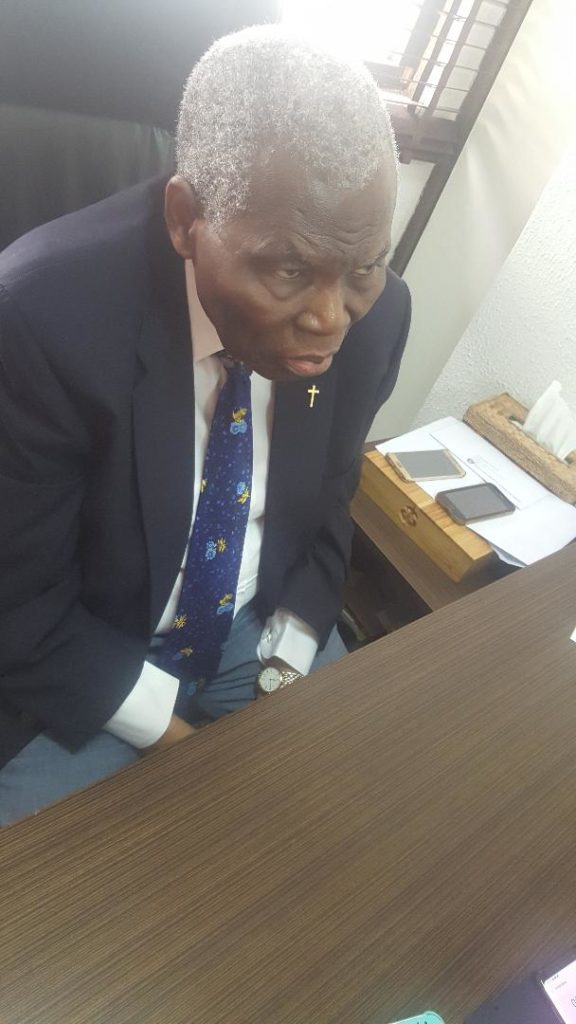
Look, it is God that gives you wisdom. Whatever wisdom I used to solve that problem was given by God. God will give me this wisdom because he knows that I am trying to do what pleases him all the time. So, the director went and brought back the import license. My staff said to me how did you do it? And I said don’t give me credit for what I haven’t got credit for. When I was having this problem, the Holy Spirit suggested to me to do this because that deputy permanent secretary would not want to be identified as a bribe taker by somebody in Onosode’s position. So offer it to him and see what happens. I repeat, there is no impossible situation. The effort to do it right, stick to it, persevere with it. Before you know it, somehow, it will happen.
Why is it that we are not seeing the kind of managing directors and chairmen that we saw then, yourself, Onosode, Ohiwere, etc?
Before you ask your long question, I already have the answer (general laughter). Let me tell you something. One day, when you wake up, and the Spirit of God will say to you that do you know that when you go out there wearing three jackets at the same time, they will send you to Aro. They will think you are not well.
If you come back to your house today, and you want to go and rest, and you say because you are an important man, they should bring three beds you want to lie on three beds. It cannot happen.
If you want to travel, and you want to ride on three cars at the same time, it cannot happen.
Almighty God is so wise. He has tailored what I need. And therefore, if I stay with what he has tailored I will not suffer this greed thing that makes people want to have and to have.
I usually joke with my wife that I admire people who marry three or four wives. I say look at you, I’m having enough trouble. Supposing there were three of you here, I would have run away (general laughter).
Once you stay in where you ought to be, you’ll be fine. One day somebody said to me, we know you are wealthy. And I said I know what you mean. You think because of the positions I have had I must have collected a lot of money. I said I am wealthy but I did not do it like that. You know the reason why I am wealthy? There is nothing I need to do that I cannot find the means of doing it. Nothing!
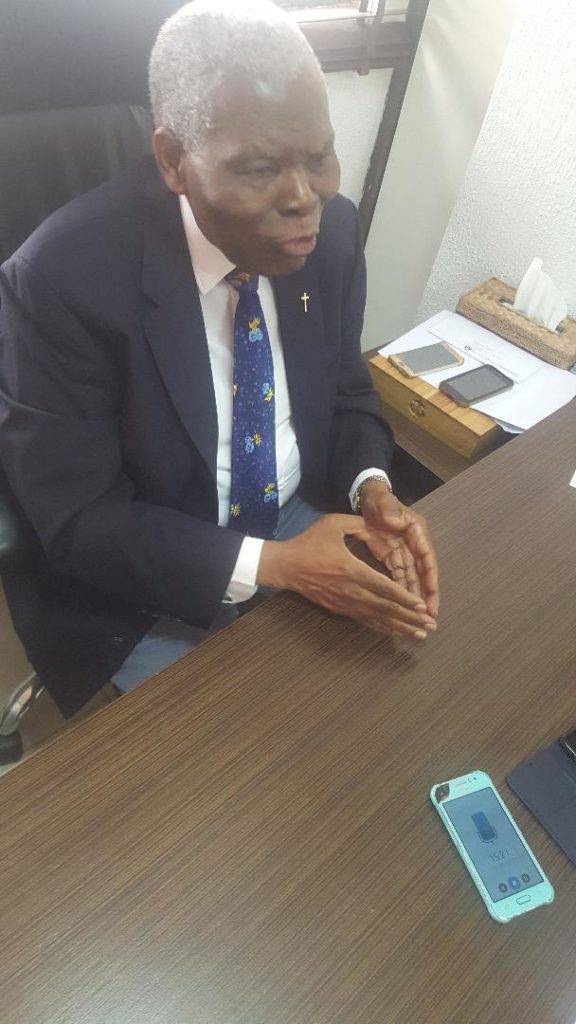
Wealth actually means either you have the means yourself or access to the means or access to the people who have the means. When it happens, you now say to God, thank you. And then you don’t have the burden of managing a situation that should not have come at all. As my parents used to tell me, if you tell one lie now, it will take several months to cover that one. It’s a natural order. If they call you and say who put this thing here, and you say it was not me. Somebody will come and say but I saw you. And you will say no it was not me you saw. And you give yourself unnecessary trouble for things that shouldn’t happen.
What is your position on those who say that the only solution to Nigeria’s problem is restructuring? What is your idea of restructuring?
We need to define and agree what we mean by restructuring. As long as there is no agreed interpretation of restructuring, you can’t use it positively to improve our position. So, what is restructuring?
The most common interpretation people give to it is returning some measure of autonomy to the states or regions, removing most of the items on the exclusive list to the residual or the concurrent list so that more money will come to the states, so that the states will have more authority over their resources.
How do they deal with the challenge that these people who now have more money are going to misappropriate it? How do you deal with that? So restructuring is not just a matter of physical or fiscal arrangement. It is that if we give you a responsibility, this is the result we expect from you. If you have accepted that responsibility willingly and nobody has forced you into it, then don’t betray the trust of those who gave you the responsibility.
READ ALSO: Clamour for Nigerian President of Southeast extraction resonates in the U.S.
Nigeria, poverty capital of the world because of patriarchy – Nkata Ndi Inyom Igbo
Today, we are in a country in which betrayal of trust is common place. We have a constitution. You see all those articles. They even swear oath when they take the responsibility. If they don’t abide by it then how much fiscal restructuring will do? For me, when people talk of restructuring, I say look at whatever structure that you have, indicate how you are going to operate that structure to achieve your objective.
Let’s see the link between your resources and your objective. Let’s see how you intend to turn this to that. Whatever is then good, do it. Let us stay within what we have agreed.
Look at what is happening with former Governor Akinwunmi Ambode in Lagos. They are accusing him of taking a decision to buy so many buses without passing through due process. Now, those who are saying so, are they telling the truth? Have they found evidence to support what they are saying? Ambode himself, does he have something to show that would demonstrate clearly that what they are saying is not true?
That was why when I went to SURE-P I said to them don’t pay me any salary. Look at all the vouchers that I signed when I was the chairman of SURE-P, the word refund must be on the voucher before I signed it. Because refund means he has spent his money, we are only paying back.
Once you have a system like that, if anybody wants to tell lies against me, I say this is the documentary evidence. You see once you take responsibility for public management, you cannot be too careful. Do the things that you need to do. And if there is somebody’s permission that you need to get to do this thing, go and get it. Don’t take anything for granted. Don’t assume anything because these resources you are using don’t belong to you. They are the joint resources of everybody around. You have a responsibility of accountability. You must be ready to stand up and say this is what I did with your money, examine me and see if I did it wrongly. And if I did it wrongly, I will acknowledge that I did it wrongly and I will pay whatever I need to pay. But I will try from the beginning to get it right.
How will you assess the government of President Muhammadu Buhari based on the three areas he told us he will address – security, economy and anti-corruption fight?
For me, any attempt to assess an activity must be based on the value you have realized from the activity. There is a lot of rhetoric that goes into crafting of policies and so on and so forth and at the end of the day, what were you hoping to achieve? If you achieve what you are hoping to achieve, even if you achieve it 70 to 80 per cent, that is fair. No human being is perfect. But if in operating your policy, the people in whose interest all of these is constructed, are not receiving satisfaction, you have to say to yourself there is something not quite right here.
I say for example the anti-corruption fight. You know the only person that doesn’t know we are fighting corruption is corruption itself because have you noticed, have you observed that corruption is any weaker than it was before? So if you are fighting corruption and corruption is thriving, something is wrong. And you see, you can’t fight corruption without thinking of the people who might want to practice corruption.
If you can take away from the human being the excuse of practicing corruption, you will fight corruption. If for instance there is greater equality among the people of Nigeria. If as you have been questioning me today, if I know that if I do my duty properly, the reward that was promised will come, that I will have no problem with it. But look, the policeman is given a responsibility and he is told this is the way you are to handle your responsibility. You are here to help people to do well. Tell me something, if you are to encounter a policeman now, the first thing in the policeman’s mind is that you must be guilty of something. But that is not the discipline of policing.
Why does anybody want to be an Abacha? Just making money to satisfy your greed. Why does anybody want to do that? Because they believe that that is the thing that will build their ego. So you have to educate people that this thing is not like that in the aspect of our management, including how we educate our people.
You see, people think that education is going to school. Yes. That is part of it. But education is building the individual. How I relate to you is part of my education. If I have been properly educated, then you say you are Igbo. Good luck to you. It happens that I am not Igbo but can you do the thing that needs to be done?
One of the reasons why Professor Anya and I are friends is that it never occurs to either of us that we have ethnic differences.
I can tell you a funny story about this. When I was a personnel director at Cadbury, I used to organize how increments are given to staff. So, one of my colleagues, a director like me, he happened to be Igbo. He had an Igbo secretary. And I said to all the directors please grade the performance of your secretaries. Let me know if it is A performance or B performance or C performance. I had a scheme. If you tell me it’s A, this is how much. If its B this is how much you will get, so I’ll just feed the grading into my system. People ended up with what was due to them from the grading.
So, this colleague of mine, unfortunately he is passed on now, graded his secretary C and I gave her a C increment. It so happened that all other directors graded their secretaries A. So, this my colleague went to the expatriate managing director to say ‘Christopher is trying to undermine me because he doesn’t like my face. All secretaries got this. My own secretary got something lower.’
So, the expatriate managing director, Mr. Clarke, called a tripartite meeting and said you made a complaint about Christopher. Tell him to his face. His only reason was that he being Igbo I didn’t like him because I didn’t like Igbos generally. After he made his case I said: ‘Ah! Let me explain to you first of all the way this thing happened. I said you remember I sent something out about grading and the way you graded your secretary.’ I said but this thing that my colleague said I don’t like Igbos, I find it funny. Why do I find it funny? He knows that I am married to an Igbo woman. So Mr. Clarke turned to him and said is that true. Do you know that Beatrice is Igbo? And he said yes (general laughter).
You can’t accuse me of not liking Igbo. How come of all the women in Nigeria, I went for an Igbo woman. So, when we finished that meeting, I went back to him and said why did you do that thing that you did? You know my wife very well. He said look, this my secretary was putting so much pressure on me.
You don’t seem to be slowing down at 87?
It is purely and simply the grace of God. When I wake up in the morning, what my mind says to me is that there are out there, chain of opportunities. So, today, you don’t know yet what you are going to encounter. But along the way there will be opportunities to do something good either for yourself or somebody else.
How did you come across this opportunity? How did you even know that you are going to wake up this morning? Now, whoever woke you up has opened you up to a new vista. Do the best with it and don’t overdo other things. You fell asleep, you don’t know when you woke up. You woke up, it is not because you planned to wake up at that time. And this thing happens to you every 24 hours since you were born and you have no control over it. You can’t decide it. You can’t choose it. That’s very strange because it means that since you can’t choose or control it, it may not happen tomorrow because whoever did it, and whoever is doing it can decide not to do it. And that is one of the things that will humble you, so even when I say ‘come and see me on Monday,’ I have no idea that I will be here on Monday. But if I stay within His design for my life, I might likely get it right. So, 87, 77, 27, it’s the same for everybody. If it pleases God to leave me here until 100 years, I won’t complain. Akintola Williams is now 100 years old.
And two of you look alike?
Well, that’s what people say (general laughter). This is why sometime when I see people in power, the way they talk, I say this person doesn’t realise that the life he is living doesn’t belong to him. He cannot claim it because it belongs to somebody else. All you have to say when you wake is ‘Lord thank you’, don’t let me miss whatever you want me to do today, just make sure that I see it clearly and do it. And if the wrong opportunities come, Lord show me which one I should ignore because I don’t want to make a mistake. So, I don’t know when it is going to happen but I’m hoping that I’m not around for too much of a long time. But it is up to Him.
Based on the allegation that the First Lady, Mrs. Aisha Buhari, made, that even with the N500 billion intervention fund, there is nothing to show for it in Adamawa State. With what you noticed in SURE-P, first of all what made you resign from SURE-P and do you think these intervention funds can ever lift people out of poverty?
Let me answer your second question. Intervention funds have value if you deploy the value appropriately, they will achieve the objective for which you put out the intervention fund. So, yes the answer is intervention funds can improve people’s lives if they are applied the way they should be applied. But, you now come back to the human question, when somebody does not keep faith with the objective of the responsibility they have accepted, when you are given N500 billion for this purpose, and on the way to achieve the purpose, you allow leakages to take place, sometimes to your own pockets, sometimes to other people’s pockets, don’t be surprised that you are not achieving your objectives. The money is neutral. It is not going to manage itself neither is it going to steal itself. That money has value. And that value will show in what you apply it to do. But if you allow leakages, it may not ever achieve that value because stolen funds are usually misspent.
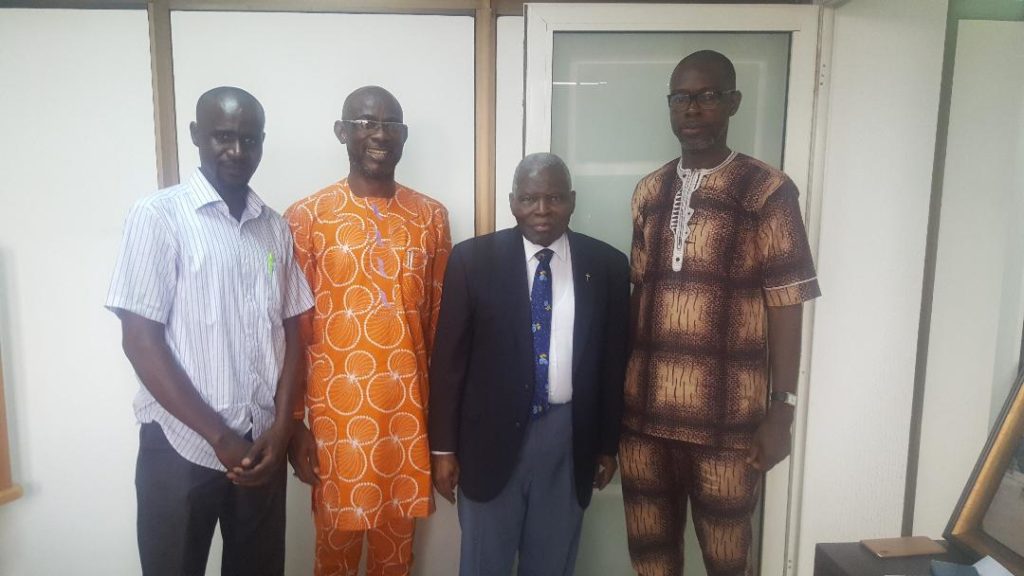
And as for why I resigned from SURE-P, I don’t know why people ask this question because it looks interesting. The point is that I went into SURE-P for a purpose. I was invited to do something. It’s like any other assignment. They invite you to come and do this. And you start doing it to the best of your ability. Now, if it gets to a point in which you are no longer able to achieve what you thought you came to achieve, or where the promises made in the system are no longer being kept, you say to yourself, now can I change this thing, and if you decide you can’t change it, you seek the alternative way of living a peaceful life. Let’s say it’s a combination of things. At the point where I thought I was no longer able to produce respectable value for SURE-P, I resigned.
- EDITOR’S NOTE: This interview was first published on October 31, 2019

